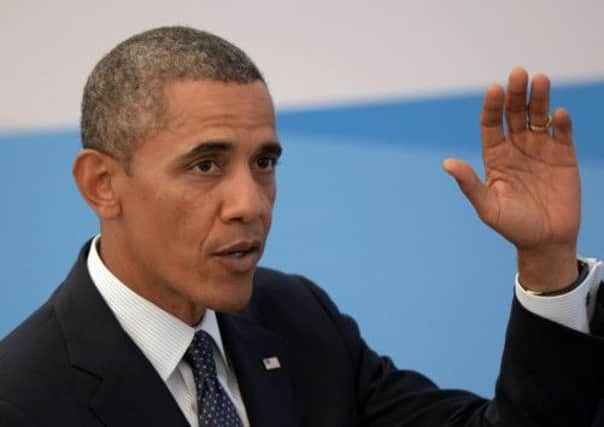Syria: US can’t turn a blind eye - Barack Obama


He said he did not want to enter into another costly and protracted war but he believed America needs to use limited military force in Syria to deter future chemical attacks.
“This would not be another Iraq or Afghanistan,” Obama said in his weekly media address, previewing arguments he will make in a nationally televised address on Tuesday.
Advertisement
Hide AdAdvertisement
Hide Ad“Any action we take would be limited, both in time and scope designed to deter the Syrian government from gassing its own people again and degrade its ability to do so,” he added.
A week ago, the president said he felt limited strikes in Syria were needed, but added he wanted to ask Congress to authorise the use of military force.
Neither Democratic nor Republican lawmakers have been keen about the prospect, partly because Americans strongly oppose becoming involved in a another Middle Eastern conflict. A poll last week showed just 19 per cent of Americans were in favour of action in Syria.
“I know the American people are weary after a decade of war, even as the war in Iraq has ended, and the war in Afghanistan is winding down. That’s why we’re not putting our troops in the middle of somebody else’s war,” Obama said in his recorded address.
Obama and his top officials plan an intensive lobbying effort on Capitol Hill this week and will seek public support in his White House address on Tuesday. He faces a tough week of trying to persuade Congress to authorise military action.
But the president says he stands by his belief that failing to respond to last month’s chemical attack, which killed more than 1,400 people, including hundreds of children, would threaten US national security by increasing the chance of future chemical attacks from the Syrian government, terrorist groups, or other nations.
“We are the United States of America. We cannot turn a blind eye to images like the ones we’ve seen out of Syria,” he said.
“Failing to respond to this outrageous attack would increase the risk that chemical weapons could be used again, that they would fall into the hands of terrorists who might use them against us, and it would send a horrible signal to other nations that there would be no consequences for their use of these weapons.
Advertisement
Hide AdAdvertisement
Hide Ad“All of which would pose a serious threat to our national security.”
Last week’s G20 summit in St Petersburg failed to produce international agreement on military action in Syria.
The US accuses president Bashar al-Assad’s forces of killing 1,429 people in a gas attack on 21 August but Russia says the attack could have been carried out by opponents of the president’s regime saying it was a provocation. Russia’s president Vladimir Putin remains opposed to any military action saying it would destabilise the region. He also said a punitive US strike on Syria would harm the global economy and stifle growth.
European Union foreign ministers say there should be no action before the UN reports back on chemical weapons attacks in Syria.
Obama emphasised that any US action in Syria would be limited and designed as a deterrent.
As the president returned to the US, his secretary of state, John Kerry, continued on a whirlwind tour of Europe in an attempt to build international support for military action in Syria.
In a four-day trip, he will be meeting with EU foreign ministers in Vilnius, Arab League representatives in Paris, his French counterpart Laurent Fabius in Paris, as well as the Foreign Secretary, William Hague, in London.
The initial purpose of his visits was to make advances on Middle East negotiations – a meeting with Palestinian president Mahmoud Abbas is still in the diary during his visit to the UK – but the issue of Syria is expected to be a priority.
Advertisement
Hide AdAdvertisement
Hide AdThe Westminster parliament’s vote on Syria has, so far, ruled out taking any action and political analysts say it is vital the US continues to gain as much international support as it can.
Putin has insisted the US push for military action had only been supported by Turkey, Canada, Saudi Arabia and France.
Kerry began his trip by meeting the president of Lithuania, the country which currently holds the presidency of the EU.
A US official conceded that there were divisions in the EU on how to act on Syria, but said Kerry would take this opportunity to discuss ways to work with the UN, as well as its limitations.
Both Russia and China, which have refused to agree to a UN security council resolution against Syria, insist any military action without the UN would be illegal.
Obama has only a few days to convince Congress, which returns from its summer recess tomorrow.
Both the Senate and House of Representatives could vote on the Syrian issue as early as the end of this week. Obama has acknowledged that he faces a “heavy lift” to win congressional backing.
More than 100,000 people have died in the two-and-a-half-year-old Syrian conflict, according to UN figures.